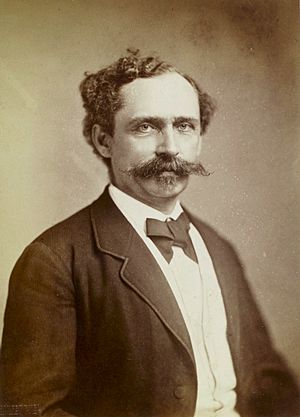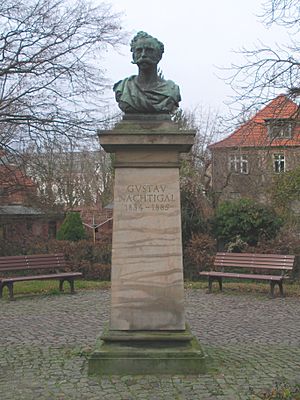Gustav Nachtigal facts for kids
Quick facts for kids
Gustav Nachtigal
|
|
|---|---|
 |
|
| Born | 23 February 1834 Eichstedt, Kingdom of Prussia
|
| Died | 20 April 1885 (aged 51) at sea off Cape Palmas, West Africa
|
| Nationality | German |
| Occupation | Military surgeon Commissioner for West Africa Consul-general for the German Empire |
| Known for | German explorer of Africa |
Gustav Nachtigal (born 23 February 1834 – 20 April 1885) was a German military surgeon and explorer. He explored parts of Central and West Africa. He was also known as a consul-general for the German Empire in Tunisia. Later, he became a Commissioner for West Africa. His work as commissioner led to Togoland and Kamerun becoming the first colonies of the German colonial empire. A special award, the Gustav-Nachtigal-Medal, is named after him. It is given by the Berlin Geographical Society.
Contents
Life and Adventures
Gustav Nachtigal was born in 1834 in Eichstedt, a town in Prussia. His father was a Lutheran pastor who died when Gustav was young. Gustav studied medicine at several universities, including Halle and Würzburg. After finishing his studies, he worked as a military surgeon in places like Cologne.
Nachtigal became sick with a lung disease. In October 1862, he moved to Annaba in Algeria for his health. He then traveled to Tunisia, where he learned Arabic. He also joined several trips into Central Africa as a surgeon.
Journey to Bornu
Later, Nachtigal returned to Germany. There, he met another explorer named Friedrich Gerhard Rohlfs. Rohlfs asked him to travel to the Bornu Empire in Africa. King Wilhelm I of Prussia gave Nachtigal a special mission. He was to deliver gifts to Umar of Borno, the ruler of the Bornu Empire. This was to thank Umar for being kind to other German travelers, like Heinrich Barth.
Nachtigal started his journey in 1869 from Tripoli, which was then part of the Ottoman Empire. His trip took two years. During this time, he visited Tibesti and Borku. These were areas in the central Sahara desert that Europeans had not explored before. He traveled with eight camels and six men.
Exploring the Sahel
From the Bornu region, Nachtigal continued his travels. He went to Baguirmi, an independent state. From there, he moved on to Wadai, a powerful Muslim kingdom. He also visited Kordofan, a region in central Sudan.
Nachtigal finally finished his long journey through the Sahel in the winter of 1874. He arrived in Khartoum, which was then a major city in Turkish-Egyptian Sudan. Many people had thought he was lost. He wrote about his travels in a book called Sahara and Sudan. This book made him famous as a great discoverer. In 1882, he received the Royal Geographical Society's Founder's Gold Medal.
Later Life and German Colonies
After France took control of Tunisia, Nachtigal was sent there as consul-general for the German Empire. He stayed there until 1884. Then, Chancellor Otto von Bismarck appointed him as a special commissioner for West Africa. German businesses in that area wanted protection from the German Empire.
Nachtigal's job was to claim land for Germany before the British could. Because of his work, Togoland and Kamerun became Germany’s first colonial possessions. On his way back from this mission, he died at sea. He was on the gunboat Möwe near Cape Palmas on 20 April 1885. He was first buried in Grand Bassam. In 1888, his remains were moved. They were reburied in a special grave in Duala, in front of the Kamerun colonial government building.
His Impact and Legacy
Gustav Nachtigal is seen as one of the most important German explorers of Africa, along with Heinrich Barth. Like Barth, Nachtigal was very interested in ethnography, which is the study of different cultures. He also studied tropical medicine. His writings are full of details. He had fair views of African people. Unlike many explorers of his time, Nachtigal did not think Africans were less important than Europeans. This can be seen in how he described them and the words he chose.
Nachtigal saw slave hunts carried out by some African rulers. He also saw the cruel things done to other Africans. He was horrified by these actions. This made him believe that European rule might help stop slave hunting and slave ownership in Africa.
See also
 In Spanish: Gustav Nachtigal para niños
In Spanish: Gustav Nachtigal para niños


